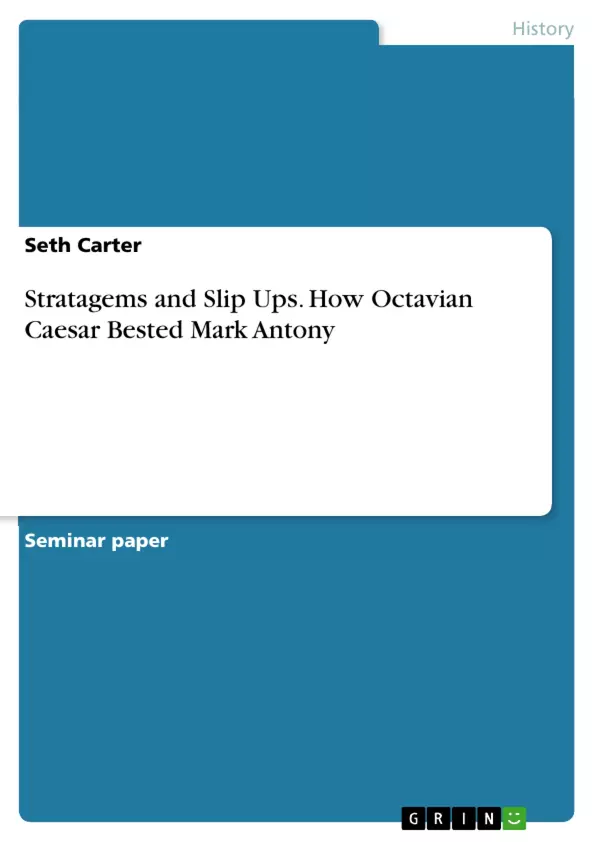This paper offers an argument intending to resolve the crucial question of why Octavian Caesar managed to politically and militarily overcome his rival Mark Antony despite possessing lesser initial resources of manpower and wealth.
The argument particularly analyzes Caesar's masterful utilization of propaganda in order to win the support of the Roman Senate as well as Antony's lack of experience in naval warfare relative to the commanders under Octavian's direction.
Inhaltsverzeichnis (Table of Contents)
- Octavian's Political Investments
- Octavian's Strategic Choices
- The Strategic Division Between Octavian and Antony
- Octavian's Use of Propaganda
- The Intensity of Propaganda-Oriented Attacks
Zielsetzung und Themenschwerpunkte (Objectives and Key Themes)
This essay examines the strategic actions taken by Octavian and Antony in the months leading up to the Battle of Actium, which marked a decisive turning point in the Roman Republic. It aims to explain how Octavian justified war with Antony and why he needed to present his actions in a specific way.
- Octavian's long-term political investments in Italy
- Octavian's skillful manipulation of Roman political and cultural norms
- Antony's failure to secure Eastern provinces and his alliance with Cleopatra
- The role of propaganda in shaping public opinion and justifying war
- The strategic stalemate between Octavian and Antony and their reliance on public support
Zusammenfassung der Kapitel (Chapter Summaries)
- Octavian's Political Investments: This section explores how Octavian, unlike Caesar, focused on building long-term relationships with the Roman elite, emphasizing traditional values. He employed a strategy of gradual respectability, seeking to secure a base of support through consistent adherence to Roman political and cultural mores, rather than seeking immediate, but potentially short-lived, absolute power.
- The Strategic Division Between Octavian and Antony: This section contrasts the strategies of Octavian and Antony. While Antony sought to establish a Greco-Roman cultural leadership role in the East, Octavian concentrated on consolidating his position in the Italian peninsula by reworking traditional Roman political and cultural values to his advantage.
- Octavian's Use of Propaganda: This section focuses on Octavian's masterful use of propaganda to garner public support. He presented himself as a defender of Roman traditions against the "foreign" influence of Cleopatra, successfully rallying military and political backing. This enabled Octavian to mask his reliance on illegitimate military power and solidify his position as a legitimate leader.
- The Intensity of Propaganda-Oriented Attacks: This section examines the escalating propaganda warfare between Octavian and Antony. Both sides engaged in vitriolic attacks, accusing each other of cowardice, weakness, and immorality, highlighting the strategic stalemate between them. This stalemate, the argument suggests, forced both men to rely heavily on swaying public opinion for success.
Schlüsselwörter (Keywords)
Key terms and concepts explored in this essay include: Octavian, Antony, Battle of Actium, Roman Republic, political strategy, propaganda, public opinion, Roman traditions, legitimacy, power, cultural influence, strategic stalemate, Greco-Roman culture, Cleopatra, Eastern provinces, Italian peninsula, political investment.
Frequently Asked Questions
Why did Octavian Caesar defeat Mark Antony?
Octavian utilized masterful propaganda to win Senate support and made long-term political investments in Italy, while Antony lacked naval experience and faced cultural backlash.
What role did Cleopatra play in Octavian's propaganda?
Octavian presented Antony as being under the "foreign" influence of Cleopatra, framing the conflict as a defense of Roman traditions against Eastern corruption.
How did Octavian build his political legitimacy?
He focused on a strategy of "gradual respectability," aligning himself with traditional Roman political and cultural norms to secure the elite's support.
What was the significance of the Battle of Actium?
The Battle of Actium was the decisive military encounter that ended the strategic stalemate and secured Octavian's path to becoming Augustus.
How did the propaganda war affect public opinion?
Intense attacks from both sides highlighted the reliance on public support, but Octavian's focus on Roman values proved more effective in the Italian peninsula.
- Citation du texte
- Seth Carter (Auteur), 2016, Stratagems and Slip Ups. How Octavian Caesar Bested Mark Antony, Munich, GRIN Verlag, https://www.grin.com/document/375475



